10 Of Bernstein's Compositions in Honor of His Birthday
Today is the birthday of one of the greatest American composers of the 20th century, Leonard Bernstein. Leonard Bernstein was also quite famous as a conductor. I have used his performances in my posts multiple times. In this article, I will list several of Bernstein's compositions with my own commentary (sorry if a lot of them are from West Side Story, but that show has a lot of good music with memorable themes that I feel I should include). But first, here's a little bit about Bernstein:
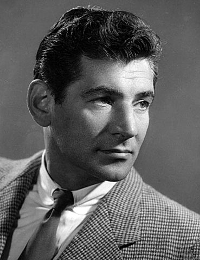
The Life of Bernstein
Leonard Bernstein was born on August 25th, 1918, in Lawrence Massachusetts, to Ukrainian-Jewish parents Jennie and Samuel Bernstein. At birth, his grandmother insisted his name be Louis, but his parents called him Leonard, unofficially, until his grandmother's death in 1933. To Bernstein's friends, however, Bernstein was known as "Lenny."
Despite his disapproval of Bernstein's interest in music, Sam Bernstein would take his son to orchestral concerts throughout Leonard's teenage years, and eventually support his musical education. Bernstein's piano instructors varied throughout his youth; but one of these instructors, Helen Coates, would eventually become his secretary.
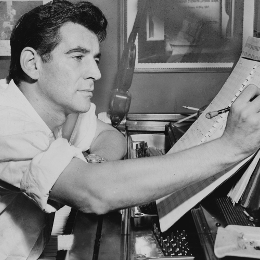
After Bernstein's graduation from the Boston Latin school in 1935, he would attend Harvard, majoring in music. His final thesis (1939) was entitled "The Absorption of Race Elements into American Music." During his time at Harvard, Bernstein would accompany the Harvard Glee club, write and conduct the musical score for a play his friend was directing by Aristophanes called The Birds, and meet conductor Dimitri Mitropoulos. It is believed that Mitropulos' power and allure as a musician was a huge contributing factor in Bernstein's eventual decision to take up conducting.
After graduating from Harvard in 1939, Bernstein would enroll at the Curtis Institute of Music in Philadelphia. Here, he would study conducting, piano, orchestration, counterpoint, and score reading. Unlike Harvard, Bernstein seems not to have enjoyed the formal training environment at Curtis. Though, he would often bring up the name of one of his instructors, Fritz Reiner, when discussing mentors in later years.
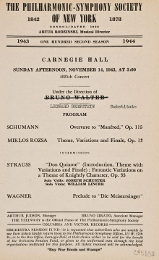
After leaving the Curtis institute, Bernstein would move to New York. Here, he would take jobs transcribing music or producing arrangements under the surname Amber (Bernstein in English is Amber) for a music publisher. He would gain his fame when he held the post of assistant conductor for the New York Philharmonic Orchestra. His conducting debut came on short notice without any chance for him to rehearse. Guest conductor Bruno Walter came down with the flu, and Bernstein had to step up to the plate. The next day, The New York Times reported about it, entitling the article "It's a good American success story." His fame was instant as a result of the radio network CBS broadcasting the concert nationally. Afterwards, Bernstein would begin to appear as a guest conductor throughout the United States. They performed pieces by composers such as Schumann, Miklós Rózsa, Wagner, and Richard Strauss.

It was at this time that Bernstein also became known as a composer with the premiere of his Jeremiah Symphony in Pittsburgh, and the opening of his ballet, Fancy Free, choreographed by Jerome Robbins, in New York. In 1946, Bernstein would begin to taste international success with his overseas debut with the Czech Philharmonic in Prague, his recording Ravel's Piano Concerto in G as soloist and conductor with the same Philharmonic Orchestra, and the European premiere of Fancy Free with the Ballet Theatre at the Royal Opera House in London.
On September 10, 1951, Bernstein would marry Chilean-born American actress Felicia Cohn Montealegre. One theory as to why he did this is that he wanted to end rumors of his private life, to secure a major conducting job. In the book, The Leonard Bernstein Letters, released in 2013, Felicia writes
"you are a homosexual and may never change—you don’t admit to the possibility of a double life, but if your peace of mind, your health, your whole nervous system depend on a certain sexual pattern what can you do?"
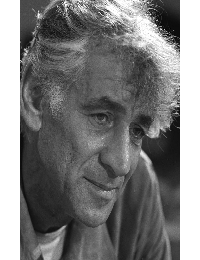
Though this confirms that Bernstein was gay, it is undoubted that the early years of their marriage were happy. There is nothing to suggest that they did not love each other, as they had three children together. Though, there are some reports to suggest that Bernstein was seeing some men at the time, with his wife knowing about it.
In 1951, Bernstein would conduct the New York Philharmonic in the premiere of a 50 year old piece, Charles Ives' second symphony. Throughout his career, Bernstein would often talk about the music of Ives who died in 1954.
In 1954 Bernstein gave his first television lecture for the CBS arts program Omnibus. The live lecture, entitled "Beethoven's Fifth Symphony," involved Bernstein describing the work with detail, with musicians from the former NBC Symphony Orchestra playing segments of it to help demonstrate, and a giant page of the score covering the floor. Here is a video of that (Don't listen to the guy in the beginning, Beethoven wasn't completely deaf at the time of writing his fifth symphony, and he never went blind):
Bernstein's popularity in the United States grew through his series of fifty-three televised Young People's Concerts for CBS, which branched out of his Omnibus lectures. The first of these concerts was aired in 1958. After this, He became just as famous for his educational work as for his conducting.
Through the rest of the 50's, Bernstein continued to run his broadcasted lectures, conduct, and compose. One of his most significant works from this time was West Side Story, which was started in 1949, and completed in 1956. In this period, West Side Story would also premiere on Broadway.
In the 60's, Bernstein would work with several prominent figures such as Carl Nielson, Jean Sibelius, and Glenn Gould. He and Gould, a virtuoso pianist, would perform Brahms' first piano concerto in D minor, further establishing his legendary reputation as a conductor. He would also conduct Nielsen's third symphony with the Royal Danish Orchestra for a recording. This would help further Nielsen's reputation in America (he was not known in America). Bernstein would also conduct for a recording of Mahler's 4th symphony. It is also notable that in 1961, the West Side Story film and soundtrack were released. This event, would cement Bernstein's role in history.
In the 70's, Bernstein would record a 200 year Beethoven birthday special in Vienna. This program was 90 minutes in length. It is also notable that in this period, Bernstein became a social rights activist. Protesting war, and fund-raising for groups such as the Black Panthers.
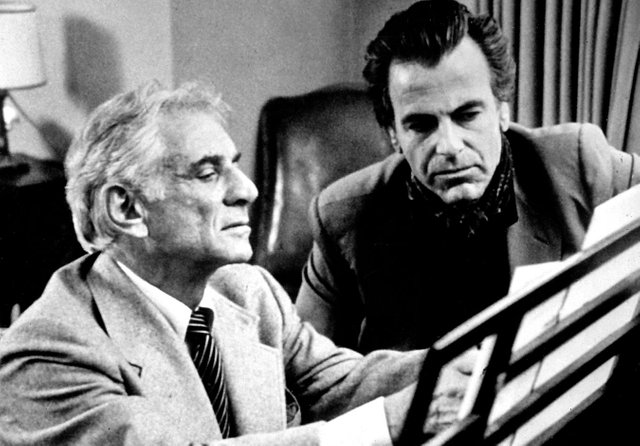
In 1980, Bernstein would be awarded the Kennedy Center Honors award. Even though he was aging, society continued to celebrate his work as both a conductor and a composer. In 1989, Bernstein would conduct Beethoven's 9th Symphony in East Berlin, to celebrate the fall of the Berlin wall. Sadly, he would die of a heart attack on October 14th, 1990. He was 72 years old. He is now buried with a copy of Mahler's Fifth symphony lying across his heart at Green-Wood Cemetery, Brooklyn, New York, next to his wife.
Some other facts: He was listed as "known communist" in the book, Red Channels, along with Pete Seeger, Aaron Copeland, and others, and was even blacklisted by the state department in the fifties. He was known for his philanthropy, and established the philosophy of Arftul Learning: or the idea that incorporation of the arts can strengthen learning in all subjects.
10 Compositions
Here are 10 of Bernstein's compositions:
10. Tonight from West Side Story
Bernstein had so many pieces in West Side Story that nearly anyone can recognize, so I will be including all of them. I personally love this duet between Tony and Maria. It is quite beautiful, and depicts both an undying love, and a fear of being caught together (as they are from rival gangs). I knew this theme before ever watching the musical, I just did not know what it was from or what it was called. I'd also like to point out that this is the equivalent to the balcony scene in Romeo and Juliet (this whole story is almost the same story as Romeo and Juliet).
9. Symphony no. 3 "Kaddish"
This whole piece is kind of creepy, with the narrator, and the creepy screechy strings/trumpets. I could imagine it being a horror soundtrack. I've never really listened to Bernstein's "instrumental" music. I'd also point out that there are singers, something quite uncommon in a symphony.
8. Dream with Me
This song is quite pretty. The piano part in the beginning sounds quite nice, and the cello/string accompaniment really brings the music together. I like how Leonard Bernstein actually makes this feel dream like, by having the accompaniment play some slight dissonances. To me, this kind of gives me a sense of fantasy. He does this well, because he does not overdo it, and make it feel almost too unrealistic.
7. The Lark
The title of this again reminds me of Romeo and Juliet, because there is a scene where they discuss whether a singing bird is a lark or not. Because if it is a lark, Romeo must leave. Anyway, this piece gives me a sense of hope, yet offset. Like you are unsure if you will accomplish something, but hopeful it will happen. I also notice that Bernstein again incorporates a narrator, almost as a method of transition.
6. America from West Side Story
This piece is probably the second most famous from West Side Story. It demonstrates Bernstein's social views about the treatment of Puerto Ricans in the 1950's. It is actually quite a catchy tune, yet quite passionate. I like how Bernstein uses the guys as almost pessimists, and the women as almost optimists. It's actually quite a cool take on viewpoints. I'd also point out that the dancing in this scene is quite cool.
5. Spring Will Come Again
This piece is quite weird. The piano part makes me think of springs rain, in the beginning, the piano chords confused me until the singer sang "spring will come again." I feel that that line brought the piece together. I think the soprano part sounds quite beautiful. The piano part had some parts I liked, and some that I disliked.
4. Symphony no. 2 "The Age of Anxiety"
The beginning of this piece is much more peaceful, and formal than his third. There is no narrator, and it doesn't make my heart race (like the third did). But considering that it is called "the age of anxiety, and he is currently building suspension, I think he is about trying to shock his audience. It is pretty cool how he uses the piano almost as a featured instrument, but not. It is like the piano is the orchestra's accompaniment.
3. Sonata for Clarinet and Piano
I like the part in the beginning where the clarinet and piano almost seem to be racing. It gets chaotic for a second, and then returns to order. This piece also has some tender, soaring moments. One thing I've noticed about these moments is that Bernstein often ends them with a deceptive cadence returning to the "chaos" that had been interrupted by the tenderness. It's almost like the piano interrupts the clarinet, changes the mood, then the clarinet joins in.
2. Symphony no. 1 "Jeremiah"
The horn part in the very beginning is very nice! He then uses this theme to build up to a much louder level than what he'd started at. I have not been too fond of his previous symphonies, due to the weird aspects such as the narrator, and the piano. I definitely like this one the most. It still sounds kind of like a horror soundtrack. I wonder if these symphonies sound like horror sound tracks can give clues as to what Bernstein was personally feeling/going through as he wrote them.
1. I Feel Pretty from West Side Story
This song is definitely the most famous from West Side Story, and probably Bernstein's most famous theme. I dislike the words, as I feel they are kind of narcissistic, but I can see what it represents. It is conveying that she feels special because a guy loves her. This song kind of represents that she is quite happy. I also love the music for this piece, especially the background singers.
Sources
Information
Photos
Previous Composer Birthdays (In order by how recent it was)
8/25 - Leonard Bernstein
6/11 - Richard Strauss
6/8 - Robert Schumann
5/22 - Richard Wagner
5/12 - Gabriel Fauré
5/7 - Johannes Brahms
5/7 - Pyotr Ilyich Tchaikovsky
4/1 - Sergei Rachmaninoff
3/21 - Johann Sebastian Bach
3/4 - Antonio Vivaldi
3/1 - Frédérick Chopin
2/28 (29) - Gioachino Rossini
2/3 - Felix Mendelssohn
1/31 - Franz Schubert
1/27 - Wolfgang (Amadeus) Mozart
The Next Birthday will be Antonín Dvořák on September 8th.
Thanks for reading this! There was a lot of personal stuff about Bernstein that I had never known until writing this article. Please comment which piece was your favorite down below, or if you think I missed a piece that should have been on this list. Another question I have for those who are interested is what should I do next year for the birthdays of the composers that I have already done? Anyway, make sure to check back later!

Also remember to check for: My weekly 7 post, As Well As My Composer Birthday Posts
Come play on my minecraft server! The Ip is: SteemCraft.mcph.co
Hi @cmp2020,
Thank you for sharing this. It was a very informative article, and I enjoyed listening to all of the embedded videos. I completely agreed with your observation that the lyrics "spring will come again" acted as a keystone linking the sections of that piece together.
We have shared this post on the Steemit's Best Classical Music Facebook page, and included it in our latest post, Steemit's Best Classical Music Roundup [Issue #13].
I loved watching Bernstein's lectures when I discovered them on Youtube. His engagement with the audience was so friendly and informative, and his respect for the intelligence of young people was clearly repaid in thoughtful attention.
Here's his lecture on Hindemith - one of my favorite composers.
Listening now. Thank you for the link! I'm a bit past 1/2 way through, and so far it is fascinating.
Glad you like it. I always loved the strange feeling of Hindemith but I never understood what he was doing until I watched that video.
Happy Birthday to one of the greatest musicians of all time. Thank you for sharing these videos with everyone. Music has a way of bringing the world together.
Thank you for retrieving the famous Lenny lectures on TV. What a show!